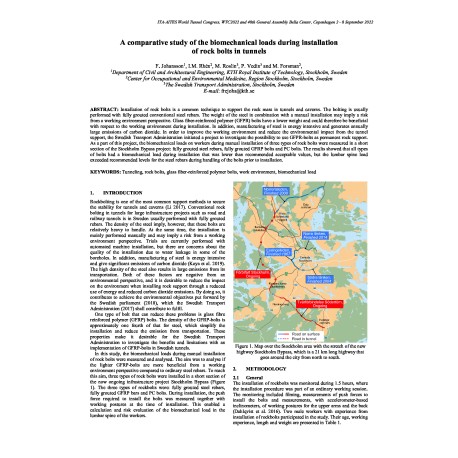Cart
0
0
No document
0,00 €
Total
Document successfully added to your shopping cart
Quantity
Total
There are 0 items in your cart.
There is 1 item in your cart.
Total documents
Total shipping
To be determined
Total
Search & filter
Search for a publication
Search & filter
New


A comparative study of the biomechanical load s during installationof rock bolts in tunnels
A_Comparative_Study_of_the_Biome
F. Johansson / M. Roslin / P. Vedin / I.m. Rhén / M. Forsman
Installation of rock bolts is a common technique to support the rock mass in tunnels and caverns. The bolting is usually performed with fully grouted conventional steel rebars. The weight of the steel in combination with a manual installation may imply a risk from a working environment perspective. Glass fiber-reinforced polymer (GFPR) bolts have a lower weight and could therefore be beneficial with respect to the working environment during installation. In addition, manufacturing of steel is energy intensive and generates annually large emissions of carbon dioxide. In order to improve the working environment and reduce the environmental impact from the tunnel support, the Swedish Transport Administration initiated a project to investigate the possibility to use GFPR-bolts as permanent rock support. As a part of this project, the biomechanical loads on workers during manual installation of three types of rock bolts were measured in a short section of the Stockholm Bypass project: fully grouted steel rebars, fully grouted GFRP bolts and PC bolts. The results showed that all types of bolts had a biomechanical load during installation that was lower than recommended acceptable values, but the lumbar spine load exceeded recommended levels for the steel rebars during handling of the bolts prior to installation.


